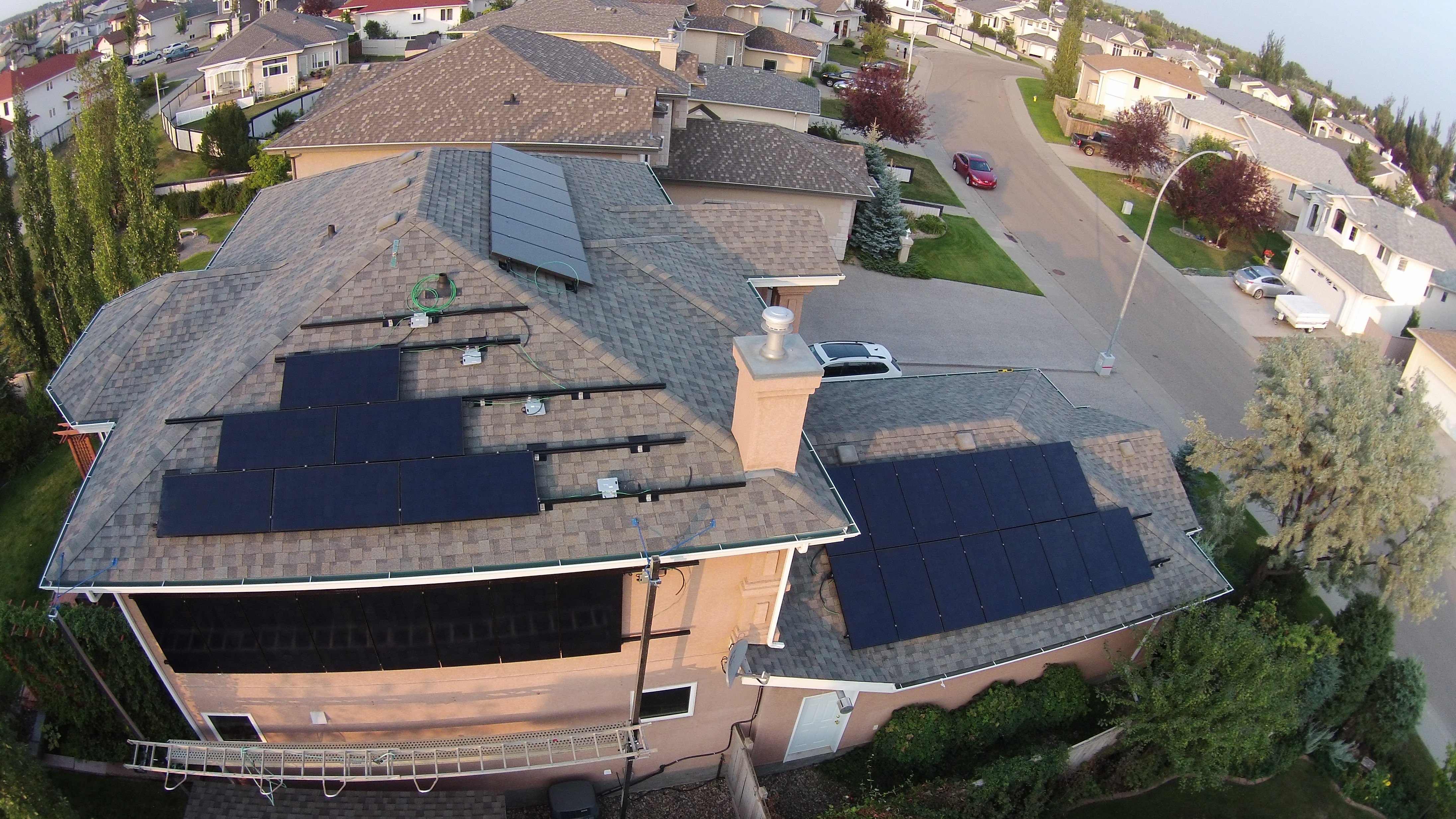oilerlord
Well-known member
This comes up every so often, and I figured it deserves it's own thread.
Can you really charge your EV for free? The answer is a theoretical yes. It depends on how many miles you put on your car, and how much you paid for your home solar system, and where you live. All-in, I'm into my project for CDN $19,000 / $2.06 per watt - and that's without rebates since there are none available in Alberta. At some point in the future I will recover that investment in lower electricity bills and by putting some of that energy into my EV. With that said, people need to know that doing solar "right" isn't cheap, and if your only motivation for doing it is to save money on gas - that money can buy a lot of gasoline.
The most important point I can make, and can't stress enough is - an improperly installed home solar system can kill you. If it isn't done right, you run the risk of getting electrocuted or burning your house down. For that reason, and unless you're a qualified electrician and have experience with installing home solar - please hire a reputable solar installer. With that said, I was involved in the design, and permitting, and sourced all of the equipment on my own but during the installation I was just a third set of hands involved in grunt work. I didn't come anywhere near high voltage danger areas.
I'll start off with some background about my solar project. It began with humble beginnings, more of a science project than anything else. I figured I'd start with 4 panels, but it eventually morphed into this (photo taken during install):

41 SunPower 225 watt panels. 9.2kW of clean DC power. You can access it's production in real-time here:
https://easyview.auroravision.net/easyview/index.html?entityId=7466210
Here is a photo of my 2014 Mercedes B250e:

My car's battery has a usable capacity of 28kWh. I expect I'll put about 10,000 miles on it per year. During the summer, it was easy to get about 100 miles on a charge, but in the extreme cold of the last few days, I'm only managing around 50 miles. I suspect that If I had a Bolt, it's 238 EPA mile rating would be cut in half too, but that's another discussion.
For the sake of figuring out how many kWh's I need for those 10,000 miles, let's assume a year average of 80 miles per charge. That amounts to 125 full charges per year. 125 charges x 28kWh = 3,500 kWh's. Of course, YMMV based on your car's efficiency and how you drive. Where I live, my system that's rated at 9.2 kW generated 9100 kWh last year. If you live in California, there's no doubt that you will generate more than my system will, so your payback will likely happen sooner depending on your cost per watt, and what you pay per kWh from your power utility.
So to figure out the ROI, let's assume I need to generate 3,500 kWh's per year to drive my EV for "free". My installation cost is $2.06 per watt, and I need 3.5kW of solar to fuel the car for a year. That equals $7,210.
First off, my apologies to another member for doubting his calculations on a 2-3 year ROI. In my case, he was right, and in SoCal with a system on a budget, he'll easily accomplish that too. Theoretically, the math does suggest that I'll be charging my car for free in a little over 2-years. With that said, my $2.06 per watt all-in cost definitely is low, mostly because the panels I bought were 5-years old. Solar installation companies in my area were quoting $4.50 per watt, so I'd be closer to 5-years had I opted for a turnkey solution.
There are mitigating factors too that puts the "charge for free" argument into question. This is one of them:

This month, I'm only going to generate about 200kWh from my system. The good news is that in July, I'll generate 1200kWh.
A few things to keep in mind is that your car isn't always plugged in when the sun is shining (and if the sun is shining). Also, your home's power consumption may be soaking up much more than your solar system produces not leaving anything left for your EV. Also, my EVSE supplies 7.3 kW to the car - my system peaks at around 7 kW from May thru August so most of the time, I'm buying power from my poco to charge my EV. Many jurisdictions allow you to "bank" your the excess power you generate but mine isn't one of them. When the sun goes down, and regardless of how much excess kWh's I export to the grid, I'm buying electricity from my poco.
All in all, I'm glad I installed the system, and have no regrets. I still think that claims that you can charge your car for free from home solar are somewhat dubious but as we all know there's more to installing solar than saving money. Feel free to ask questions or comment. I'm interested in hearing your point of view.
Can you really charge your EV for free? The answer is a theoretical yes. It depends on how many miles you put on your car, and how much you paid for your home solar system, and where you live. All-in, I'm into my project for CDN $19,000 / $2.06 per watt - and that's without rebates since there are none available in Alberta. At some point in the future I will recover that investment in lower electricity bills and by putting some of that energy into my EV. With that said, people need to know that doing solar "right" isn't cheap, and if your only motivation for doing it is to save money on gas - that money can buy a lot of gasoline.
The most important point I can make, and can't stress enough is - an improperly installed home solar system can kill you. If it isn't done right, you run the risk of getting electrocuted or burning your house down. For that reason, and unless you're a qualified electrician and have experience with installing home solar - please hire a reputable solar installer. With that said, I was involved in the design, and permitting, and sourced all of the equipment on my own but during the installation I was just a third set of hands involved in grunt work. I didn't come anywhere near high voltage danger areas.
I'll start off with some background about my solar project. It began with humble beginnings, more of a science project than anything else. I figured I'd start with 4 panels, but it eventually morphed into this (photo taken during install):

41 SunPower 225 watt panels. 9.2kW of clean DC power. You can access it's production in real-time here:
https://easyview.auroravision.net/easyview/index.html?entityId=7466210
Here is a photo of my 2014 Mercedes B250e:

My car's battery has a usable capacity of 28kWh. I expect I'll put about 10,000 miles on it per year. During the summer, it was easy to get about 100 miles on a charge, but in the extreme cold of the last few days, I'm only managing around 50 miles. I suspect that If I had a Bolt, it's 238 EPA mile rating would be cut in half too, but that's another discussion.
For the sake of figuring out how many kWh's I need for those 10,000 miles, let's assume a year average of 80 miles per charge. That amounts to 125 full charges per year. 125 charges x 28kWh = 3,500 kWh's. Of course, YMMV based on your car's efficiency and how you drive. Where I live, my system that's rated at 9.2 kW generated 9100 kWh last year. If you live in California, there's no doubt that you will generate more than my system will, so your payback will likely happen sooner depending on your cost per watt, and what you pay per kWh from your power utility.
So to figure out the ROI, let's assume I need to generate 3,500 kWh's per year to drive my EV for "free". My installation cost is $2.06 per watt, and I need 3.5kW of solar to fuel the car for a year. That equals $7,210.
First off, my apologies to another member for doubting his calculations on a 2-3 year ROI. In my case, he was right, and in SoCal with a system on a budget, he'll easily accomplish that too. Theoretically, the math does suggest that I'll be charging my car for free in a little over 2-years. With that said, my $2.06 per watt all-in cost definitely is low, mostly because the panels I bought were 5-years old. Solar installation companies in my area were quoting $4.50 per watt, so I'd be closer to 5-years had I opted for a turnkey solution.
There are mitigating factors too that puts the "charge for free" argument into question. This is one of them:

This month, I'm only going to generate about 200kWh from my system. The good news is that in July, I'll generate 1200kWh.
A few things to keep in mind is that your car isn't always plugged in when the sun is shining (and if the sun is shining). Also, your home's power consumption may be soaking up much more than your solar system produces not leaving anything left for your EV. Also, my EVSE supplies 7.3 kW to the car - my system peaks at around 7 kW from May thru August so most of the time, I'm buying power from my poco to charge my EV. Many jurisdictions allow you to "bank" your the excess power you generate but mine isn't one of them. When the sun goes down, and regardless of how much excess kWh's I export to the grid, I'm buying electricity from my poco.
All in all, I'm glad I installed the system, and have no regrets. I still think that claims that you can charge your car for free from home solar are somewhat dubious but as we all know there's more to installing solar than saving money. Feel free to ask questions or comment. I'm interested in hearing your point of view.
